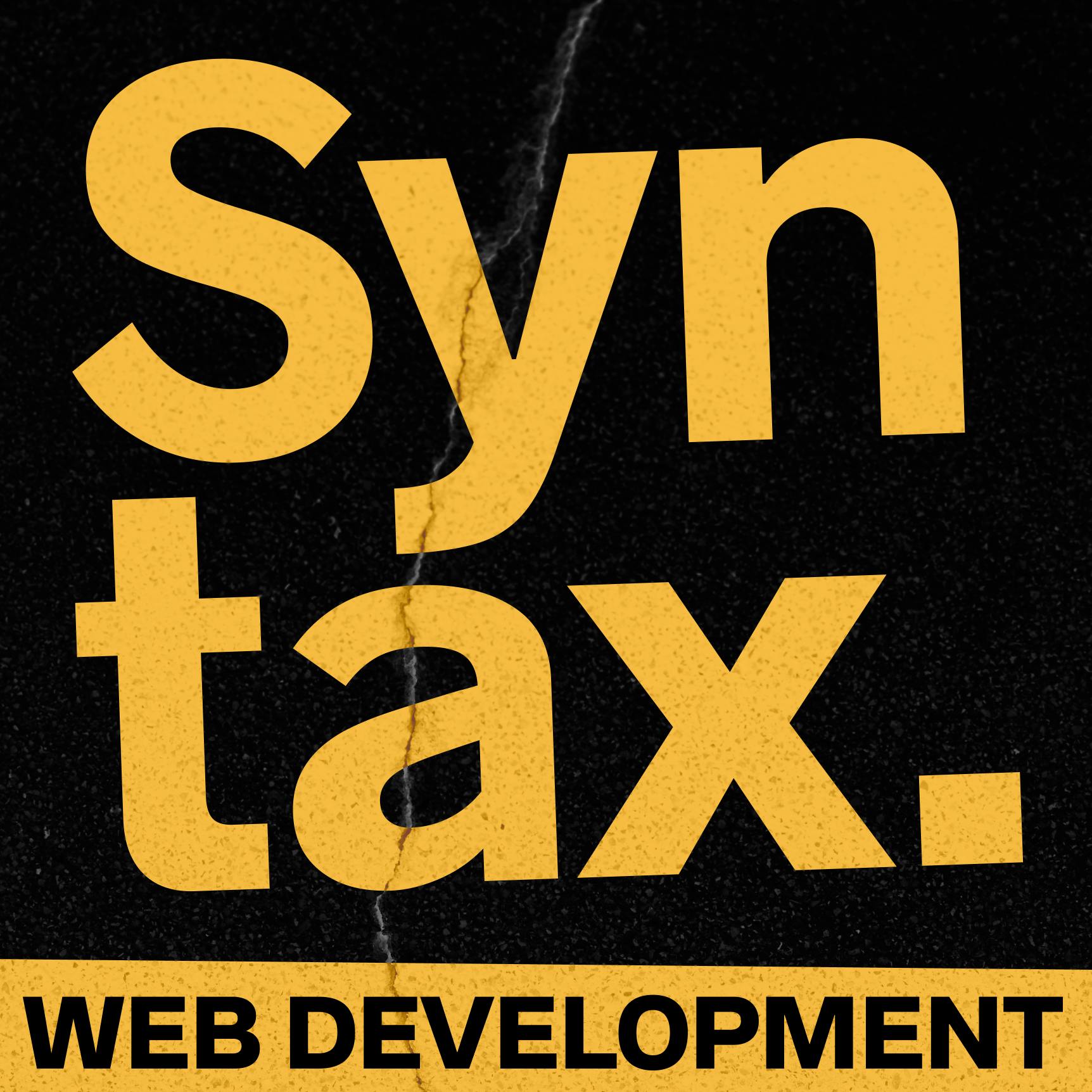

Syntax - Tasty Web Development Treats
Wes Bos & Scott Tolinski - Full Stack JavaScript Web Developers
Full Stack Developers Wes Bos and Scott Tolinski dive deep into web development topics, explaining how they work and talking about their own experiences. They cover from JavaScript frameworks like React, to the latest advancements in CSS to simplifying web tooling.
Episodes
Mentioned books

May 6, 2019 • 12min
Hasty Treat - Async + Await Error Handling Strategies
Dive into the world of error handling strategies in async/await programming. Discover how traditional try/catch techniques compare to using higher-order functions for cleaner management. Learn about the critical Node.js unhandled rejection event and how to effectively communicate errors to users. Explore the integration of Sentry for real-time error tracking and monitoring. It's all about making error resolution faster and more efficient!

May 1, 2019 • 51min
Potluck - Media Queries × NPM Vulnerabilities × Fullstack JS vs JAMstack × Web VR/AR × Switching Jobs × More!
Wes and Scott dive into the nitty-gritty of responsive design, tackling media queries and their SEO implications. They discuss the exciting realms of Web AR and VR, highlighting practical uses for these emerging technologies. Career growth is addressed, with insights on knowing when to switch jobs while balancing satisfaction and financial gains. The contrasting methodologies of Fullstack JS versus JAMstack are analyzed, providing freelancers with crucial insights. Plus, they share tips on styling in React and the benefits of error tracking for developers.

Apr 29, 2019 • 23min
Hasty Treat - AMA - Money x Investments x Online Presence x More!
Scott and Wes dive into diverse income sources beyond coding, sharing insights on stocks and cryptocurrency. They offer strategies for building an authentic online presence with a focus on quality content and originality. Discover the challenges of managing rental properties and personal finance strategies for achieving financial freedom. The hosts also explore YouTube algorithms with a side of tasty food anecdotes, and share effective tips to overcome creative ruts by shaking up routines and prioritizing self-care.

Apr 24, 2019 • 50min
What’s New in Web Development
Discover the latest advancements in web development, from new JavaScript promise static methods to lazy loading techniques that boost performance. Dive into the creative potential of CSS Houdini for custom styling and explore the updates on CSS Subgrid for better layout flexibility. Learn about the benefits of Progressive Web Apps and their impact on user experience. Plus, enjoy a conversation about the cultural connections between punk music and the web development community, making for a vibrant discussion!

Apr 22, 2019 • 27min
Hasty Treat - CSS Frameworks
Discover the fascinating world of CSS frameworks, where pre-written CSS simplifies web design. Scott and Wes delve into the pros and cons, discussing heavyweights like Bootstrap and sleek utility-first frameworks such as Tailwind. They tackle challenges like CSS class hell and the balance between productivity and maintainability. Optimize your code with tips on reducing CSS size and the tools to elevate your web performance. This convo is a tasty treat for any web developer looking to enhance their styling game!

Apr 17, 2019 • 51min
9 Ways to Stay Sane While Working Remotely
Discover tips for staying sane while working remotely! Explore the importance of having a designated workspace and prioritizing tasks. Learn to deal with distractions by logging out of social media and utilizing focus apps. The conversation highlights the value of social interactions and stepping outside for fresh air. Get inspired to act like you're going to work by dressing well, and remember to take regular breaks. These practical strategies will help you maintain productivity and clarity in your home office.

Apr 15, 2019 • 24min
Hasty Treat - Cranky Developers
The discussion dives into the world of cranky developers who resist new tech choices. Scott and Wes explore how to navigate their skepticism and emphasize the importance of asking key questions about tech decisions. They share strategies for convincing reluctant peers through proof of concept and acknowledge the risks involved in changing technologies. There's a focus on the consequences of complacency and the need for developers to evolve. Ultimately, fostering a progressive mindset can enhance team dynamics and drive success.

Apr 10, 2019 • 1h 6min
Syntax Live React Edition
Wes and Scott dive into a lively interactive experience centered on React, featuring games that challenge audience knowledge of popular websites using the framework. They explore fun and unconventional opinions on React while conducting quizzes and discussions about custom hooks like `useClickOutside`. The duo also shares amusing anecdotes through a coding challenge, and highlights the significance of effective error tracking with Sentry. Listeners gain insights into simplifying React for beginners, making the complex world of web development more accessible and engaging.

Apr 8, 2019 • 21min
Hasty Treat - Tips For A Good Portfolio
Scott and Wes dive into the essentials of crafting a standout portfolio. They discuss the balance between aesthetics and content, emphasizing quality screenshots and the need to keep work updated. Strategies are shared on how to highlight skills while respecting project confidentiality. Using recognizable logos and short descriptions can enhance credibility. They also explore the idea of side projects and the importance of platforms like Dribbble and GitHub in boosting hireability. Tune in for tips that could elevate your portfolio.

Apr 3, 2019 • 50min
Potluck - Interview Qs × Headless CMS × React Hooks × Resume Design × Redux vs Context × More!
Dive into a fun discussion about what makes a standout resume and the importance of simplicity. Explore the nuances of headless CMS options and the shift from customer service to coding, along with valuable advice for finding remote work. The hosts tackle whether Redux is still relevant with the rise of React Hooks and Context API. Get personal insights on tech interviews, mastering algorithms, and recommendations for learning resources, all while enjoying light-hearted anecdotes and humor!


